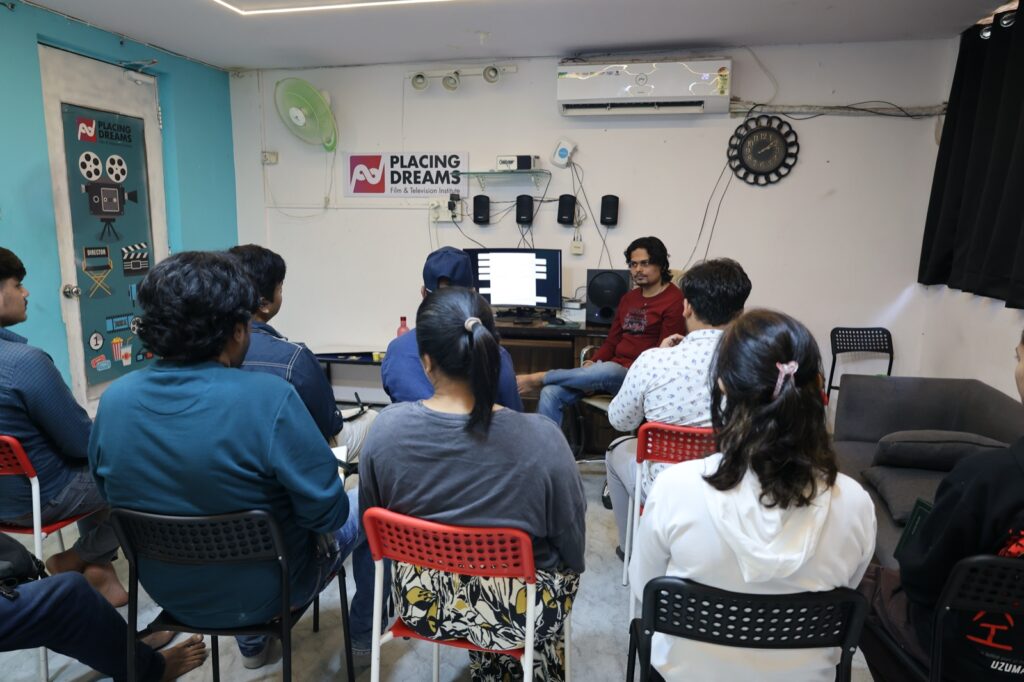
Choosing the right filmmaking school in Mumbai, a hub of the Indian film industry, is crucial for aspiring filmmakers. Here are the essential factors to consider when making this important decision:
1. Curriculum and Specializations
- Check the Course Content: Ensure the school offers a comprehensive curriculum covering:
- Directing
- Cinematography
- Scriptwriting
- Editing
- Sound Design
- Production and Post-production
- Specialisations: Look for programs tailored to your interests, whether it’s direction, production, or technical fields.
2. Faculty and Mentors
- Industry Experience: Research the faculty’s background. Are they experienced filmmakers, writers, or technicians?
- Guest Lectures: Check if the school invites industry professionals for workshops or guest lectures.
3. Practical Learning Opportunities
- Hands-On Experience: Choose a school that emphasizes practical learning through:
- Short film projects
- On-set training
- Equipment handling
- Access to Equipment: Ensure the school provides access to industry-standard equipment like cameras, lighting, and editing software.
4. Alumni Success
- Track Record: Investigate the success of the school’s alumni. Are they working in the industry? Have they won awards or recognition?
- Networking Opportunities: Strong alumni networks can provide valuable connections and mentorship.
5. Location and Facilities
- Proximity to the Industry: Being in Mumbai allows access to film studios, production houses, and networking opportunities.
- Infrastructure: Look for schools with well-equipped studios, editing labs, and sound recording rooms.
6. Placement Support
- Internships and Jobs: Does the school offer placement assistance, internships, or industry tie-ups?
- Showcases and Festivals: Some schools organize film festivals or screenings to showcase student work to industry professionals.
7. Course Duration and Flexibility
- Full-Time vs. Short-Term: Decide based on your time commitment and career goals. Short-term workshops might be better for those already working in the field.
- Flexible Timings: Check if part-time or weekend courses are available if you have other commitments.
8. Fees and Scholarships
- Affordability: Compare the fees with the facilities and quality of education offered.
- Scholarships: Check if the school offers financial aid or scholarships for deserving students.
9. Accreditation and Certification
- Ensure the school is recognized by reputable institutions or has industry affiliations.
- A well-regarded certification can boost your credibility in the industry.
10. Reviews and Testimonials
- Student Feedback: Read reviews from current students and alumni to understand their experiences.
- Online Forums: Join filmmaking communities to get honest opinions about various schools.
11. Industry Connections
- Partnerships: Schools connected to production houses, directors, and studios often provide better exposure.
- Internship Opportunities: Institutions with strong ties to the film industry can help bridge the gap between education and professional work.
12. Trial Classes or Workshops
- Attend an open house, workshop, or demo class to gauge the teaching style and infrastructure.
Top Filmmaking Schools in Mumbai (Examples)
- Film and Television Institute of India (FTII), Mumbai Campus
- Placing Dreams Film & Television Institute
- Mumbai Digital Films Academy
- St. Pauls Institute of Communication Education
- Craft Film School
